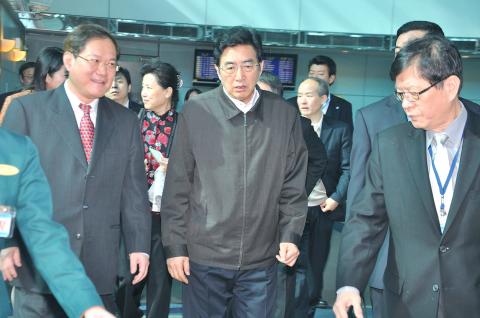Beijing Mayor Guo Jinlong’s (郭金龍) recent visit to Taipei indicates Taiwan and China are using cultural exchanges as the next step in building more stable relations across the Taiwan Strait, academics said prior to Guo’s departure yesterday.
No Chinese provincial delegation visited Taiwan in the six months prior to the Jan. 14 presidential election because of political concerns, but the visits have since resumed and academics believed Guo’s trip had special significance.
“Guo’s visit indicates that interactions between the two sides are moving from economic dynamics to cultural ones and beyond,” Straits Academic and Cultural Exchange Association vice president Pan Hsi-tang (潘錫堂) said.

Photo: CNA
Guo, who led a delegation of more than 100 people, was the first mayor of Beijing to visit Taiwan. The aim of his six-day trip was to promote cultural exchanges.
The visit and the recent completion of a Chinese-language database jointly compiled by Taiwanese and Chinese academics indicate a shift in focus to cultural aspects and an attempt by the two sides to seek new possibilities in understanding each other, Pan said.
Other academics said Guo’s visit could be seen as a friendly gesture from the Chinese government, which is trying to create favorable conditions for negotiations on a political agenda after the signing of the Economic Cooperation Framework Agreement (ECFA) in 2010.
Chang Wu-yueh (張五岳), director of Tamkang University’s Graduate Institute of China Studies, said Beijing is trying to reset the tone of cross-strait relations after President Ma Ying-jeou (馬英九) was re-elected last month.
Addressing Chinese President Hu Jintao’s (胡錦濤) “six points” speech in 2008 — regarded as the guideline for China’s Taiwan policy — Chang said Beijing seems to be preparing for the next stage of negotiations, which would be more politically oriented. In Hu’s speech, the promotion of Chinese culture was considered the third task in cross-strait relations, coming after the establishment of political trust and economic cooperation.
“Beijing could be moving forward in anticipation of more stable and predictable Taiwan-China relations during Ma’s second term,” Chang said.

Aftershocks from a magnitude 6.2 earthquake that struck off Yilan County at 3:45pm yesterday could reach a magnitude of 5 to 5.5, the Central Weather Administration (CWA) said. Seismological Center technical officer Chiu Chun-ta (邱俊達) told a news conference that the epicenter of the temblor was more than 100km from Taiwan. Although predicted to measure between magnitude 5 and 5.5, the aftershocks would reach an intensity of 1 on Taiwan’s 7-tier scale, which gauges the actual effect of an earthquake, he said. The earthquake lasted longer in Taipei because the city is in a basin, he said. The quake’s epicenter was about 128.9km east-southeast

GENSLER SURVEY: ‘Economic infrastructure is not enough. A city needs to inspire pride, offer moments of joy and foster a sense of belonging,’ the company said Taipei was named the city with the “highest staying power” in the world by US-based design and architecture firm Gensler. The Taiwanese capital earned the top spot among 65 cities across six continents with 64 percent of Taipei respondents in a survey of 33,000 people saying they wanted to stay in the city. Rounding out the top five were Vietnam’s Ho Chi Minh City (61 percent), Singapore (59 percent), Sydney (58 percent) and Berlin (51 percent). Sixth to 10th place went to Monterrey, Mexico; Munich, Germany; Sao Paulo, Brazil; Vancouver; and Seoul. Cities in the US were ranked separately, with Minneapolis first at

The New Taipei City Government today warned about the often-overlooked dangers of playing in water, and recommended safe swimming destinations to cool off from the summer heat. The following locations in the city as safe and fun for those looking to enjoy the water: Chienshuiwan (淺水灣), Baishawan (白沙灣), Jhongjiao Bay (中角灣), Fulong Beach Resort (福隆海水浴場) and Sansia District’s (三峽) Dabao River (大豹溪), New Taipei City Tourism and Travel Department Director-General Yang Tsung-min (楊宗珉) said. Outdoor bodies of water have variables outside of human control, such as changing currents, differing elevations and environmental hazards, all of which can lead to accidents, Yang said. Sudden

Tropical Storm Podul has formed over waters north-northeast of Guam and is expected to approach the seas southeast of Taiwan next week, the Central Weather Administration (CWA) said today. The 11th Pacific storm of the year developed at 2am over waters about 2,660km east of Oluanpi (歐鑾鼻), Pingtung County — Taiwan's southernmost tip. It is projected to move westward and could have its most significant impact on Taiwan on Wednesday and Thursday next week, the CWA said. The agency did not rule out the possibility of issuing a sea warning at that time. According to the CWA's latest update, Podul is drifting west-northwest